How Much Does It Cost to Widen a Driveway?

A narrow driveway is unappealing and inconvenient, and it can become useless when you outgrow it. Whether you have a bigger vehicle or simply need to fit more cars in the driveway, it is better to widen your driveway than redo it entirely. So, how much does it cost to widen a driveway?
It costs an average of $17 per square foot to widen a driveway between the labor and materials. Homeowners can spend as little as $700 to widen an asphalt or gravel driveway by 100 square feet. You can expect to spend another $3,450 for excavation, $275 for a permit, and $1,400 to install a new drainage system on average if it is necessary.
Additional costs are not always necessary, but they may be unavoidable when you widen a driveway. Factors such as the permit, materials, and condition of the existing driveway determine how much you will spend. Follow along as we take a look at how much it costs to widen a driveway.
Cost to Widen Driveway
It costs an average of $17 per square foot to widen a driveway, but it varies based on the material that you choose. Homeowners can spend up to $50 per square foot to widen a driveway with expensive materials such as concrete blocks and high-end brick pavers. However, costs can soar to an average of $57 per square foot when you factor in labor costs.
Labor generally accounts for 50% of the budget when you hire professionals to widen your driveway. Builder-owners spend an average of $275 on permits to widen a driveway, but it can cost as little as $50. Costs also vary based on how wide you plan to make your driveway and if the new coverage requires additional work.
Add-ons such as landscaping, a border, or a new drainage system can add another $1,400 on average to your budget. The most important cost factors when you widen a driveway are materials, labor, and land preparation. You can save thousands of dollars if you install cheap pavers to widen your driveway, but it is ideal to hire a professional.
Additional Costs
It is rarely a simple job when you widen a driveway, and it can often carry additional costs. The most common additional cost in widening a driveway is excavation, and it costs an average of $3,450. You will have to obtain a permit right away, and that can cost as little as $50 or as much as $500 depending on where you live.
Generally, a contractor will come to look at the driveway and write up a budget for the project. In some cases, you will need to add a new drainage system to accommodate a wider driveway. You can expect to spend $1,400 on average to install a new drainage system, but it can cost up to $2,400 or more.
Some builder-owners need to remove trees along the driveway to widen it, and it costs an average of $150 per tree. However, tree removal can cost up to $2,000 in some cases if it is deeply rooted or large. Otherwise, the only other common additional cost to widen a driveway is customization, but that comes into play when you get into materials.
| Add-Ons | Average Cost |
| Excavation | $3,450 |
| Drainage System | $1,400 |
| Tree Removal | $150 |
| Permit | $275 |
Driveway Extension Cost
Driveway extensions are essentially the same as widening a driveway, except you are expanding the driveway lengthwise rather than widthwise. The cost to extend a driveway is virtually the same as widening a driveway, with most homeowners paying between $3 and $12 per square foot. Like widening, extension costs will vary based on the material and how much of it the project requires. Driveway extensions may also require a new drainage system, additional excavation, and a new apron where your driveway meets the street. This particular project also requires some unique considerations, including:
- Acquiring the necessary permits, which range from $50 to $500.
- City regulations regarding driveway length.
- Whether you’ll have to replace curbs or sidewalks after the project is complete.
Extending a driveway is usually a more involved process than widening one. Since you may be encroaching on the public street, the rules established by the city play a bigger role in the project.
Why Widen a Driveway?
Driveways are often considered one of the most valuable features that a home has, but only if they are practical. Nowadays, it’s not uncommon to find homes that are advertised with ‘driveways,’ but only have a tiny paved space in the front of the home that is only big enough for one small car.
In this case, you may consider widening the driveway before you sell the home or, if you are home buyer, widening the driveway after the purchase. Here are just some of the many reasons why you may consider widening your driveway:
1. More space
An off-road parking space is a major asset. Not only does it ensure that your vehicle is safer and lowers your insurance costs, it simply makes parking much easier. Gone are the days of trying to save a spot on the street in front of your house. Or, if you live in a neighborhood that has weekly street cleanings, you will no longer have to move your car to avoid getting a ticket. In fact, experts suggest that adding an extra parking space to a driveway can increase your property value by at least $5,000.
2. You own more than one car
One car families are becoming increasingly more rare. For a family of four, it’s very likely that both parents have a car of their own. This is the most convenient way to get around – whether it’s running errands around town, taking the kids to school, or commuting to work.
A standard-sized driveway (although there really isn’t a standard size) will usually only allow for one car to be parked, with someone always left to find parking on the street. Even long driveways can be an issue. While they may fit three cars, with one in front of the other, you’ll constantly be shuffling cars around when someone has to leave. Therefore, choosing to widen your driveway can make parking several cars quicker and more convenient.
3. You have larger vehicles
With so many people owning SUVs and crossovers, homeowners are finding that they need to widen their existing driveway to accommodate larger cars. This can be particularly important if you have large trucks or work vehicles that you also need to park on your driveway. By choosing to widen your driveway, you will no longer have to worry about the type of vehicle that you or one of guests wants to park.
4. You want easier access for people
A narrow driveway that has a car parked makes It incredibly difficult for people to squeeze by. There’s always a risk that your car could get scratched, or someone could get hurt by attempting to squeeze past. This problem is even worse if you have a stroller that you need to get by or someone in a wheelchair.
To allow for more pedestrian access, you may consider widening your driveway. In this instance, the expansion doesn’t have to be extra-wide. Instead, you just need a level, smooth pathway that runs alongside the driveway.
5. You want to build a garage
The final reason that someone may consider widening their driveway is so that can ultimately build a garage on top of it. A narrow driveway limits the flexibility and choices you have in terms of the type of garage you can build. However, by widening your driveway, you’ll be able to construct the garage that fits your specific needs.
6. Improve curb appeal
Curb appeal is everything when you sell your house, and it can make the entire process easier. Wide driveways are more desirable because they can accommodate more cars and appeal to families. Whether it is a family or a single homeowner with multiple cars, prospective buyers are more likely to respond to a wide and comfortable driveway than a narrow one.
Sure, a wide driveway can directly increase your property value, but so can the curb appeal that it adds. A wide driveway contributes to curb appeal when you pair it with an inviting exterior and landscaping that compliments it.
Calculating Driveway Width for Extra Cars
The average car is roughly seven feet wide and 15 feet long, while the average two-car driveway is approximately between 16 and 18 feet wide. An excellent way to determine the size of driveway that you need to accommodate the number of cars you want to park is to consider the width of a typical parking spot in a parking lot. Parking spots are usually about nine feet wide and 18 feet long.
Cost to Replace Driveway
Depending on the condition of your current driveway, you may be forced to replace it entirely. The cost to replace a driveway averages around $4,300, with an extra $1 to $2 per square foot to have the old driveway removed. For most types of driveways, you’re looking at around $2 to $15 per square foot for both the materials and installation. The replacement process involves:
- Breaking up the old driveway material.
- Hauling away this material.
- Performing some minor grading of the area.
- Installing the new driveway.
If you’re making any major changes to the location, size, shape, or grade, you can expect to pay more on your driveway replacement.
Cost of New Driveway by Material
While $4,300 is the average cost to replace or install a new driveway, this can vary from $1,500 to over $11,000 depending on the specific material that you choose. The higher cost usually relates to the price of the supplies and material required for the installation, and doesn’t necessarily mean the driveway is going to last longer. With that said, the table below outlines the average cost to build a new driveway by material.
| Type of Material | Cost Per Square Foot | Average Total Cost |
| Concrete | $4 to $8 | $2,400 to $4,800 |
| Asphalt/ Blacktop | $3 to $7 | $1,800 to $4,200 |
| Gravel | $1 to $3 | $600 to $1,800 |
| Chip Seal | $2 to $5 | $1,200 to $3,000 |
| Heated | $12 to $28 | $7,200 to $16,800 |
| Pavers | $10 to $30 | $6,000 to $18,000 |
| Permeable Pavers | $8 to $30 | $4,800 to $18,000 |
| Grass Pavers | $4 to $12 | $2,400 to $7,200 |
| Exposed Aggregate/ Pebble | $5 to $11 | $3,000 to $6,600 |
| Rubber | $6 to $11 | $3,600 to $6,600 |
Concrete
Concrete costs an average of $6 per square foot and is the most common driveway material. Prices range between $4 and $8 per square foot, and a full concrete driveway costs an average of $3,600. However, it may only cost $700-$1,200 to widen a concrete driveway depending on how much wider you want to make it.
Concrete driveways last for 35 years on average, and it is ideal to resurface them every 3 years. Builder-owners spend an average of $13 per square foot to widen a concrete driveway if you customize the color, pattern, or border.
Asphalt
You can expect to spend $5 per square foot to widen an asphalt blacktop driveway. A full asphalt driveway can cost up to $3,000 or more, and you can generally widen one for $1,000. Asphalt is one of the cheapest driveway materials, but you’ll have to spend an average of $170 to reseal it every 4 years.
Gravel
The material cost of gravel is only $2 per square foot, but labor adds another average of $2-$5 per square foot when you widen a driveway. You can expect to spend up $700 to add 100 square feet of gravel to your driveway. Gravel driveways are among the most cost-effective, but they aren’t as durable as concrete or pavers.
However, a gravel driveway can last up to 100 years if you add 2”-3” inches of gravel every 3 years. Pea gravel, river rock, and marble chips are the sturdiest type of gravel for your driveway.
Chip Seal
Chip seal costs an average of $3.50 per square foot in material costs, or $7 per square foot after labor. You can widen your chip seal driveway by up to 100 square feet for $700 or less depending on how much you spend on labor. It costs less to widen a driveway with chip seal than asphalt, but chip seal is just as durable.
Heated Driveway
Widening a radiant heated driveway can be complicated, and you will likely have to pay for an entirely new one. You can expect to pay $25 per square foot to widen a heated driveway on average. It is expensive because of how complicated it is, and the cost varies on the material that you put on top of the heating element.
Additional costs include the average $360 that it costs to run a heated driveway each winter. Check with your contractor to see whether you should redo your heated driveway entirely or if it is worth only widening. It isn’t always possible to widen a heated driveway depending on how it was installed.
Luckily, you can save money with a $1,600 heated driveway mat that you can lay over the surface. A heated driveway mat generally comes in one piece that you can roll out and lay over your driveway in cold weather. It is expensive to widen a heated driveway because you’ll have to widen it and pay for a new heated topper.
Cobblestone, Concrete, and Brick Paver
The cost to widen a driveway with pavers varies based on the type of paver you choose. Concrete pavers cost an average of $5 per square foot and are the most common option. Brick pavers are more visually appealing than concrete pavers and cost $6 per square foot before labor.
The most expensive type of stone paver is cobblestone, and it costs $57 per square foot to widen a cobblestone paver driveway on average. Luckily, it is usually a quick job to widen a driveway with pavers unless you need to excavate the land.
Grass Driveway
It costs an average of $8 per square foot to widen a grass driveway or $1.80 per square foot to widen it with plain sod. Sod is the cheapest option because you don’t have to do much land preparation compared to a standard grass driveway. You have to pay nearly $7 more per square foot for a standard grass driveway because you generally need to excavate and level the ground.
It may be tempting to widen a driveway with sod, but it isn’t always effective. Sod cannot handle heavy cars or heavy traffic, and rain can create major problems. You can expect to pay $800 or less or widen a grass driveway.
Pebble
Pebble varies in cost based on the aggregate you choose, and it costs an average of $8 per square foot to widen a pebble driveway. It can sometimes be tricky to find a pebble pattern to widen your driveway that matches the existing pebble. In that case, some homeowners opt to resurface or redo their pebble driveway altogether.
You will need to resurface your pebble driveway every 3 years after you widen it so that it stays durable. It can cost up to $16 per square foot or more to widen a pebble driveway if you customize the pattern. Builder-owners spend an average of $4,500 to fully redo and widen a pebble driveway.
Rubber
Rubber driveways can be tricky to widen in some cases and cost an average of $9 per square foot. Depending on how old the existing rubber is, you may have to redo or resurface it when you widen the driveway. You can expect to spend up to $3,600 to widen a rubber driveway between your permit, labor, and materials.
Cost of New Driveway by Square Foot
As previously mentioned, the cost to widen a driveway, install a new driveway, or replace an existing one is largely influenced by square footage. In fact, driveway installation costs range from between $1 and $50 per square foot – with most homeowners paying between $3 and $12 per square foot. Again, the material that you choose is ultimately going to be the final deciding factor. The table below outlines the average cost of a driveway based on total square footage:
| Square Feet of Driveway | Average Cost Range |
| 400 square feet | $1,200 to $4,800 |
| 600 square feet | $1,800 to $7,200 |
| 800 square feet | $2,400 to $9,600 |
| 1000 square feet | $3,000 to $12,000 |
Related Articles

Jessica considers herself a home improvement and design enthusiast. She grew up surrounded by constant home improvement projects and owes most of what she knows to helping her dad renovate her childhood home. Being a Los Angeles resident, Jessica spends a lot of her time looking for her next DIY project and sharing her love for home design.
More by Jessica Stone



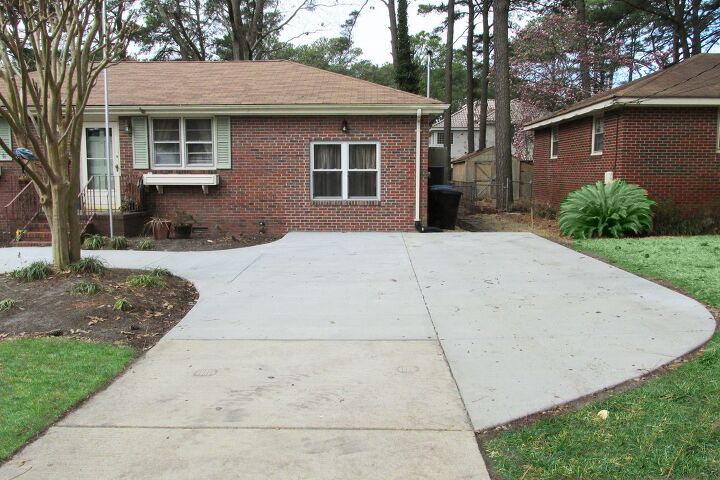






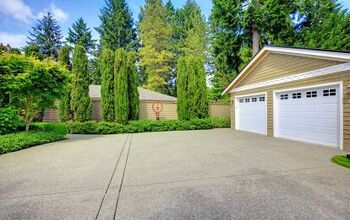
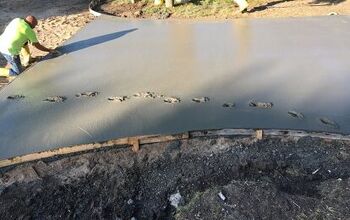
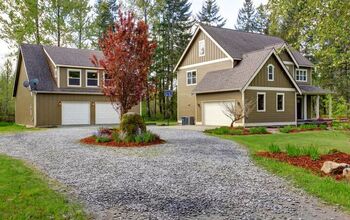
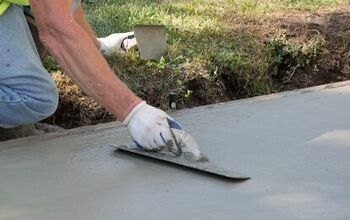
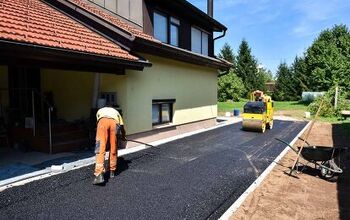

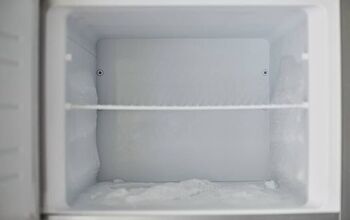
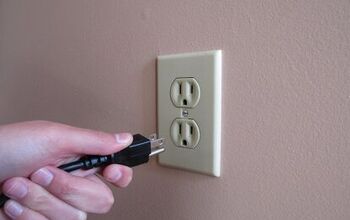



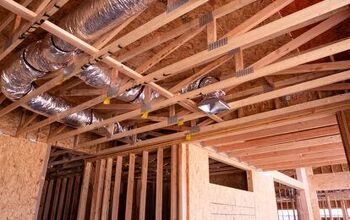
![10 Most Dangerous Neighborhoods in Baltimore [Updated]](https://cdn-fastly.upgradedhome.com/media/2023/07/31/9075655/10-most-dangerous-neighborhoods-in-baltimore-updated.jpg?size=350x220)




